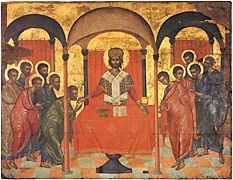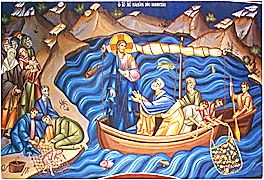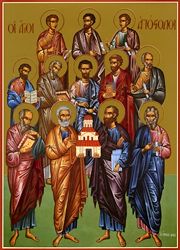Difference between revisions of "Apostles"
m (→The Seventy: Epaphroditus on March 30) |
(Other Apostles) |
||
| Line 37: | Line 37: | ||
==Other Apostles== | ==Other Apostles== | ||
The [[Apostle Paul]] ([[June 29]]) is also referred to as an apostle, though he is not one of the Twelve or of the Seventy. Other missionary saints are also referred to as apostles, though usually not as an initial title, but rather as an epithet, e.g., "Apostle to the North" (though some regard this usage as not traditionally Orthodox). Further, other saints have the epithet "equal to the apostles" (in Greek, Ισαποστολος), usually because of their significant work in building up the Church. St. Paul shares the collective feast day with the Twelve Great Apostles. He was beheaded in Rome during the reign of Emporer Nero. | The [[Apostle Paul]] ([[June 29]]) is also referred to as an apostle, though he is not one of the Twelve or of the Seventy. Other missionary saints are also referred to as apostles, though usually not as an initial title, but rather as an epithet, e.g., "Apostle to the North" (though some regard this usage as not traditionally Orthodox). Further, other saints have the epithet "equal to the apostles" (in Greek, Ισαποστολος), usually because of their significant work in building up the Church. St. Paul shares the collective feast day with the Twelve Great Apostles. He was beheaded in Rome during the reign of Emporer Nero. | ||
| + | |||
| + | * Apostle of the Ardennes: Saint [[Saint Hubertus|Hubert]], 656 - 727 | ||
| + | * Apostle to the Armenians: Saint [[Gregory the Illuminator]], 256 - 331 | ||
| + | * Apostle to [[Styria (duchy)|Karantania]]: Bishop Virgilius of [[Salzburg]] (745-84) | ||
| + | * Apostle to the Cherokees: [[Cephas Washburn]] | ||
| + | * Apostle to the English: Saint [[Augustine of Canterbury|Augustine]], died 604 | ||
| + | * Apostle to the Franks: Saint [[Denis]] (3rd century) | ||
| + | * Apostle to the Franks: [[Saint Remigius]], ca 437 - 533 | ||
| + | * Apostle to the Frisians: Saint [[Willibrord]], 657 - 738 | ||
| + | * Apostle to the Gauls: Saint [[Irenaeus]], (130 - 200 | ||
| + | * Apostle to the Gauls: Saint [[Martin of Tours]], 338 - 401 | ||
| + | * Apostle to the Gentiles: Saint [[Paul of Tarsus|Paul]] | ||
| + | * Apostle to the Germans: Saint [[Boniface]], 680 - 755 | ||
| + | * Apostle to the Goths: Bishop [[Ulfilas]] | ||
| + | * Apostle to Hungary: Saint [[Anastasius]], 954 - 1044 | ||
| + | * Apostle to India: Saint [[Thomas (apostle)|Thomas]] | ||
| + | * Apostle to Ireland: Saint [[Saint Patrick|Patrick]], 373 - 463 | ||
| + | * Apostle to [[Noricum]]: Saint [[Severinus]] | ||
| + | * Apostle to the North: Saint [[Ansgar]], 801 - 864 | ||
| + | * Apostle to the Parthians: Saint [[Thomas (apostle)|Thomas]] | ||
| + | * Apostle to the Picts: Saint [[Ninian]], 5th century | ||
| + | * Apostle to the Scots: Saint [[Columba]], 521 - 597 | ||
| + | * Apostle to the Slavs: Saint [[Cyril]], c 820 - 869 | ||
| + | * Apostle to the Slavs: [[Saint Methodius]] | ||
| + | * Apostle of [[Spain]]s: [[James the Great]] (d. [[44]]) | ||
| + | |||
| + | |||
| + | |||
[[Category:Biblical Saints]] | [[Category:Biblical Saints]] | ||
[[Category:Missionaries]] | [[Category:Missionaries]] | ||
[[Category:Saints]] | [[Category:Saints]] | ||
Revision as of 17:36, August 9, 2005
An Apostle is one who is sent out by our Lord Jesus Christ to spread the gospel that he is the Messiah, that he is risen, and that we are being saved as a result.
The word apostle comes from the Greek αποστολος, literally meaning "one who is sent out." Originally a military term referring to a sortie sent out against the enemy, apostle has in the Christian context come to refer to a missionary spreading the gospel of Jesus Christ.
The Twelve
Our Lord originally appointed twelve apostles as his initial Church community, commissioned with the task of sharing the faith. As told in the Gospels, Judas Iscariot was originally one of them, but with his apostasy and death, he was replaced with Matthias. Their collective feast day is June 30.
After Judas' replacement, the Twelve consisted of the following:
|
|
The Seventy
The Seventy Apostles are those whom the Lord chose (described in Luke 10:1-16) in addition to the Twelve and sent forth to assist in the work of preaching. Over time, the Twelve added others to their number, who were sent out with the original Seventy to preach the gospel. Although this number eventually exceeded seventy, they were all nevertheless referred to as "of the Seventy" out of reverence to the number which the Lord originally chose. Their collective feast day is January 4.

It is difficult to determine a comprehensive and accurate list of the Seventy, but here are some of their names:
Achaicus, Agabus, Alphaeus, Amplias, Ananias (who baptized Paul), Andronicus, Apelles, Apollo, Apphia, Aquila, Archippus, Aristarchus, Aristobulus, Artemas, Asyncritus, Barnabas (leader of the Seventy and companion of Paul), Caesar, Carpus, Cephas, Clement, Cleopas (who accompanied the Lord to Emmaus), Crescens, Crispus, Epaphroditus, Epenetus, Erastus, Evodus, Fortunatus, Gaius, Hermas, Hermes (bishop of Dalmatia), Herodian, James (the Brother of God, also called "the Less"), Jason, Junia, Justus (brother of the Lord), Linus, Lucius, Luke the Evangelist (companion of Paul and author of the Gospel that bears his name), Mark the Evangelist (companion of Paul and author of the Gospel that bears his name), Narcissus, Nathaniel, Nicanor (one of the original seven deacons), Olympas, Onesimus, Onesiphorus, Parmenas (one of the original seven deacons), Patrobas, Philemon, Philip (one of the original seven deacons), Philologos, Phlegon, Priscilla, Prochorus (one of the original seven deacons), Pudens, Quadratus, Quartus, Rodion, Rufus, Silas (companion of Paul), Silvan, Sosipater, Sosthenes, Stachys, Stephen the Protomartyr (one of the original seven deacons), Terpnus, Tertius, Thaddeus (sometimes confused with Jude of the Twelve), Timon (one of the original seven deacons), Timothy (companion of Paul), Titus, Trophimus, Urban, Zacchaeus, and Zenas.
Other Apostles
The Apostle Paul (June 29) is also referred to as an apostle, though he is not one of the Twelve or of the Seventy. Other missionary saints are also referred to as apostles, though usually not as an initial title, but rather as an epithet, e.g., "Apostle to the North" (though some regard this usage as not traditionally Orthodox). Further, other saints have the epithet "equal to the apostles" (in Greek, Ισαποστολος), usually because of their significant work in building up the Church. St. Paul shares the collective feast day with the Twelve Great Apostles. He was beheaded in Rome during the reign of Emporer Nero.
- Apostle of the Ardennes: Saint Hubert, 656 - 727
- Apostle to the Armenians: Saint Gregory the Illuminator, 256 - 331
- Apostle to Karantania: Bishop Virgilius of Salzburg (745-84)
- Apostle to the Cherokees: Cephas Washburn
- Apostle to the English: Saint Augustine, died 604
- Apostle to the Franks: Saint Denis (3rd century)
- Apostle to the Franks: Saint Remigius, ca 437 - 533
- Apostle to the Frisians: Saint Willibrord, 657 - 738
- Apostle to the Gauls: Saint Irenaeus, (130 - 200
- Apostle to the Gauls: Saint Martin of Tours, 338 - 401
- Apostle to the Gentiles: Saint Paul
- Apostle to the Germans: Saint Boniface, 680 - 755
- Apostle to the Goths: Bishop Ulfilas
- Apostle to Hungary: Saint Anastasius, 954 - 1044
- Apostle to India: Saint Thomas
- Apostle to Ireland: Saint Patrick, 373 - 463
- Apostle to Noricum: Saint Severinus
- Apostle to the North: Saint Ansgar, 801 - 864
- Apostle to the Parthians: Saint Thomas
- Apostle to the Picts: Saint Ninian, 5th century
- Apostle to the Scots: Saint Columba, 521 - 597
- Apostle to the Slavs: Saint Cyril, c 820 - 869
- Apostle to the Slavs: Saint Methodius
- Apostle of Spains: James the Great (d. 44)

